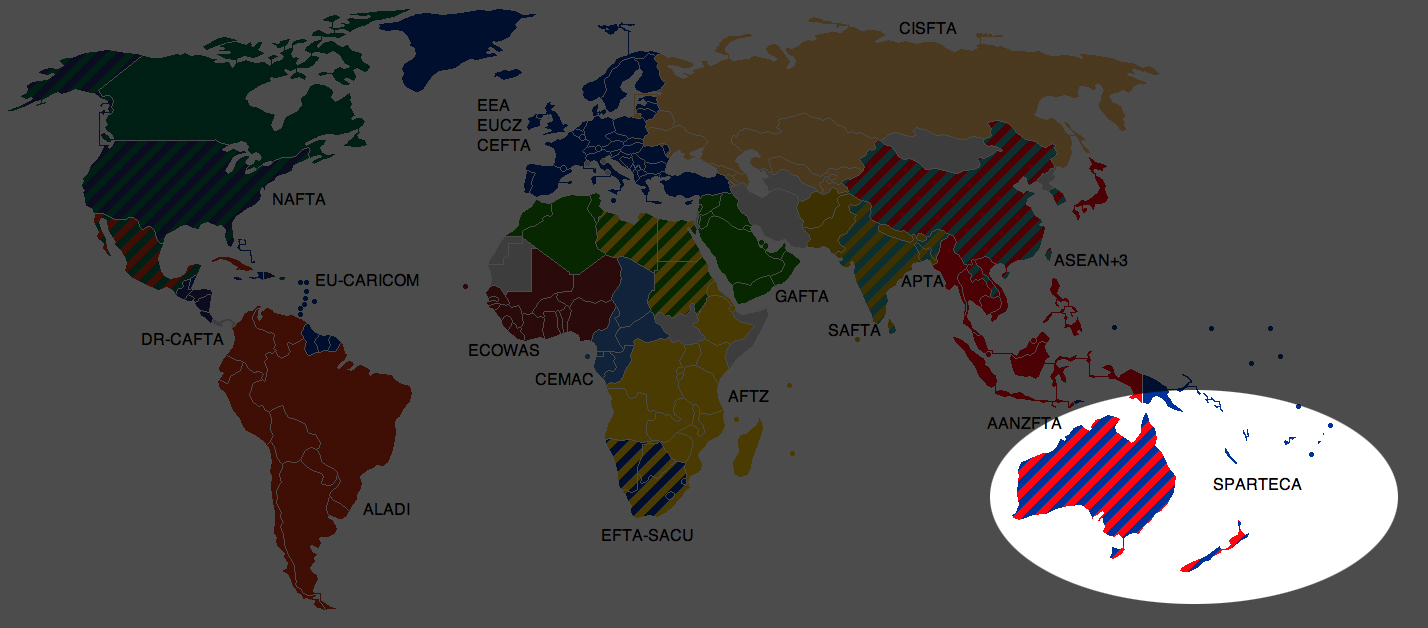People in the Western Hemisphere may
consider Australia and New Zealand more as tourist destinations than
viable, exporting trade partners. While it's true Australia alone
enjoyed an increase in foreign visitors in the last year, one cannot
rule out their contribution to the global economy. This isolated
country/continent is ranked among the top twenty national economies
and has entered numerous free trade agreements with countries close
to home and on the other side of the world. Australia's involvement
in the South Pacific Regional Trade and Economic Co-Operation
Agreement, or SPARTECA, serves to bring Australian influence to
lesser island nations in the Southern Hemisphere and improve trade
relations among members.

SPARTECA has its roots in a treaty
signed in July, of 1980 at a meeting of a group known as the Forum
Island Countries, or FIC. The purpose of the treaty initially was to
encourage trade among the smaller, lesser developed island nations of
South Pacific with New Zealand and Australia. SPARTECA nations may
trade amongst themselves without duty taxes and other restrictions.
Current members of SPARTECA include:
Australia - Australia holds the
largest economy among the current SPARTECA roster. The Australian
dollar is standard among several other island nation members, who
trade with Australia for goods like beef, grains, and coal.
Cook Islands - This chain of
small islands is technically part of New Zealand, and relies heavily
upon tourism for their economy. Their geographical location allows
for limited trade opportunities, though fruits and fish are exported
regularly to Australia and Japan.
Fiji - While a popular tourist
destination in the Pacific, Fiji has not existed without political
controversy. A military coup in the late 2000s resulted in a
governmental flux, and citizens continue to await the opportunity
for fair elections. Prime exports of Fiji include timber, seafood,
and various precious metals.
Kiribati - Once known as the
Gilbert Islands, Kiribati is a former British colony with one of the
lowest GDPs on record. Fish is a prime export, though Kiribati
relies upon aid often from more developed neighbors like Australia
and Japan.
Marshall Islands - A pivotal
area during World War II with regards to nuclear testing, these
Micronesian islands rely more upon imported goods from the United
States, Japan, and Australia than they are able to export. Like
other member nations in SPARTECA, seafood is a major industry.
Nauru - Nauru has the
distinction of being one of the least populated independent nations
in the world, and having a rather large unemployment rate. Strip
mining is the major industry on the island.
New Zealand - New Zealand
remains a constitutional monarchy under Queen Elizabeth II and is a
highly developed island nation within SPARTECA, though trade is
crucial to their economic status. Wool is perhaps their best known
export, along with dairy and livestock to major partners Australia
and China.
Niue - New Zealand is this
island's largest benefactor, and the New Zealand "Kiwi" dollar
is their standard currency. Nearly everything exported from here -
honey, coconuts, and passion fruit - is distributed among SPARTECA
nations.
Papua New Guinea - This British
commonwealth nation is one of the least developed and explored in
the world, yet is rich in natural resources like palm oil and
precious metals which are traded to Australia.
Samoa - Samoa represents one of
the larger islands in Polynesia, and like other SPARTECA nations
relies upon crops of coconuts and indigenous fruits for their
exports.
Solomon Islands - This
Melanesian nation subsists on fishing industries and exports nearly
half of their goods - coconut products, cocoa, and other crops -
to Japan.
Tonga - Tonga presently seeks to
grow as a tourism destination in the South Pacific, but for now they
rely on cash crops such as root vegetables, coconuts, and bananas to
trade.
Tuvalu - As one of the smallest
nations in the world, Tuvalu has experienced little to no economic
growth in recent years. Interestingly enough, the nation derives
some income through sales of their desirable national Internet
domain suffix (.tv).
Vanuatu - Vanuatu is dependent
on their agriculture and tourism to maintain their economy.
Television viewers may be familiar with the island nation through
reality shows as Survivor , which has filmed on location.
One of the major challenges to SPARTECA
is the obvious underdevelopment of the lesser member nations and
their dependence on the larger economies of Australia and New Zealand
for aid. The islands of Polynesia and Micronesia may see branching
out trade to Europe and the Americas as a challenge if there are not
enough goods to produce to meet a demand. To this end, a focus on
tourism may help boost these minor economies, though their isolation
in terms of geography presents issues for travelers outside of
Australia and New Zealand.
Nonetheless, while SPARTECA plays a
small role in trade on the global scale, one may become aware of the
contributions these island nations make to the world economy through
their involvement with Australia.